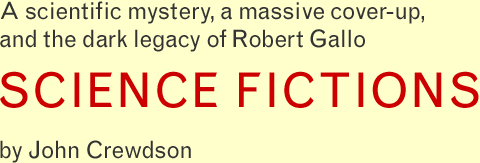 |

 

|
| | 
October 2008:
A quarter-century after the discovery of HIV and the invention of the HIV blood test at the Pasteur Institut in Paris, the Nobel Prize in Medicine was awarded to Pasteur researchers Francoise Barre and Luc Montagnier.
Not included in that award was Robert Gallo, who for many of those 25 years had attempted to claim credit as the discoverer, and later the co-discoverer, of HIV. With that verdict, science at last accepted what the evidence had long shown, that the fundamental discoveries leading to the recognition of HIV as the cause of AIDS had occurred in France, and not in Gallo’s laboratory at the U.S. National Cancer Institute. One of the most divisive and destructive disputes in modern scientific history had at last been laid to rest. — John Crewdson

|
| ‘ |
The tale of Dr. Robert Gallo’s role in the discovery of the virus that causes AIDS is one of those stories that wouldn’t be believable as fiction...Science Fictions is bursting with allegations leveled at Dr. Gallo, his associates, rivals and enemies, that include deception, misconduct, incompetence, fraud, sabotage, back-stabbing, double-dealing, overstatements, half-truths, outright lies, a clandestine affair with a co-worker, a bribery attempt, denials, evasions, coverups and serial rewritings of history.’
— New York Times
|
| ‘ |
Scrupulously researched and sweeping... Science Fictions documents enough treachery, negligence and megalomania to make even the most trusting of readers skeptical of the scientific establishment.’
— Washington Post
|
| ‘ |
A gripping work with important implications...With incredible tenacity, Crewdson reveals a biological research scandal that was significant, frightening and, most of all, a testament to one reporter’s quest to separate science fact from fiction.’
— Chicago Tribune
|
| ‘ |
Crewdson’s work is the most powerful and revealing since James Watson’s The Double Helix...This is an awesomely documented prosecutorial brief that concedes no credit to its target and yields him no doubts. If the Gallo camp has a rebuttal, let’s hear it.’
— New Scientist
|
| ‘ |
No one knows whether someone in Gallo’s lab stole the French virus or if it contaminated their samples through sloppy practice, and it really doesn’t matter… And as Crewdson shows, the biggest discoveries in Gallo’s career — his claim to have identified the virus that causes AIDS and the patent on the AIDS blood test — both belong to someone else.’
— Baltimore Sun
|
| ‘ |
Robert Gallo’s hour was not the brightest for American science. In fact, it may be one of the darkest. The two-decade-long sequence of events described in John Crewdson’s new book resembles more the actions of a megalomaniac intent more on self-promotion and profit than on a way to stop the AIDS epidemic.’
— San Diego Union-Tribune
|
| ‘ |
I could hardly put the book down out of a mounting realization that this was more than a story about human vanity and political corruption. Science Fictions is ultimately a scientific detective story, with dramatic plot twists, inspired sleuthing, and unlikely heroes. It’s a crime with many victims, and one that is well worth the effort to understand.’
— Washington Monthly
|
| ‘ |
John Crewdson, a Pulitzer prize-winning journalist, has written a detailed history of the events that led scientists to the cause of AIDS - and it makes unpleasant reading for anyone who thought science was simply about the pursuit of truth. Instead, a picture emerges of deliberate falsehoods, exaggerated claims and denigrating criticism.’
— The Independent (London)
|
| ‘ |
Crewdson’s squalid tale of grasping self-interest in the face of a devastating epidemic is told through court documents, reports from internal NIH and congressional investigative committees and interviews. The enormous amount of evidence which the author has gathered in favor of the French seems convincing.’
— Los Angeles Times
|
| ‘ |
Science Fictions is about scientists behaving very, very badly. Crewdson’s research is thorough, his writing brisk.’
— Edmonton Journal
|
| ‘ |
A compelling case that Gallo claimed and obtained recognition for research that had, in fact, been accomplished by the French...this book is a successful indictment of Gallo, whom history will probably judge to have been guilty of excessive zeal in the pursuit of scientific glory.’
— Montreal Gazette
|
| ‘ |
Was Gallo’s behavior so extreme as to be anomalous, or was it to some extent encouraged by what Crewdson calls a “hypercompetitive” scientific culture? If Science Fictions forces scientists to address these difficult questions — and it should — it will have served its purpose.’
— New York Times Book Review
|
| ‘ |
Science Fictions is a profoundly disturbing account, demonstrating that even brilliant minds may trade truth for fame or fortune...John Crewdson has written a masterpiece.’
— Providence Journal-Bulletin
|
| ‘ |
Comprehensive and compelling...The level of drama here is unprecedented…Crewdson is able to weave a story that is impossible to put down.’
— Publishers Weekly
|
| ‘ |
A meticulous account of slippery science that develops slowly into a panoramic view of the biomedical world.’
— Kirkus Reviews
|







